Mitsubishi Space Star vs Volvo EC40 – Differences & prices compared
Compare performance, boot space, consumption and price in one view.
Find out now: which car is the better choice for you – Mitsubishi Space Star or Volvo EC40?
The Mitsubishi Space Star (Hatchback) comes with a Petrol engine and Manuel or Automatic transmission. In comparison, the Volvo EC40 (SUV) features a Electric engine with Automatic transmission.
When it comes to boot capacity, the Mitsubishi Space Star offers 235 L, while the Volvo EC40 provides 404 L – depending on how much space you need. If you’re looking for more power, decide whether the 71 HP of the Mitsubishi Space Star or the 442 HP of the Volvo EC40 suits your needs better.
In terms of consumption, the values are 4.90 L per 100 km for the Mitsubishi Space Star, and 16.30 kWh for the Volvo EC40.
Price-wise, the Mitsubishi Space Star starts at 11600 £, while the Volvo EC40 is available from 46600 £. Compare all the details and find out which model fits your lifestyle best!
Mitsubishi Space Star
The Mitsubishi Space Star offers a compact yet surprisingly spacious experience, making it an ideal choice for urban dwellers who need agility and comfort. Its sleek design is complemented by a range of vibrant colour options, adding a touch of flair to everyday commutes. With a focus on efficiency and practicality, the Space Star combines a user-friendly interface with modern technology to ensure a smooth driving experience.
details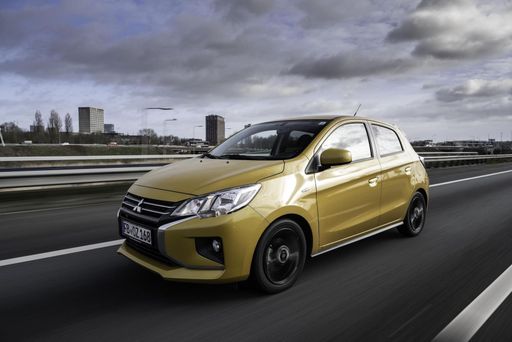 @ presse.mitsubishi-motors.de
@ presse.mitsubishi-motors.de
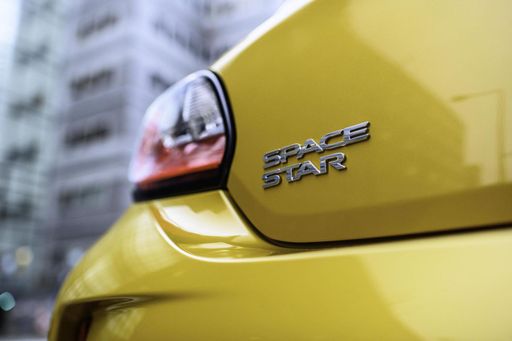 @ presse.mitsubishi-motors.de
@ presse.mitsubishi-motors.de
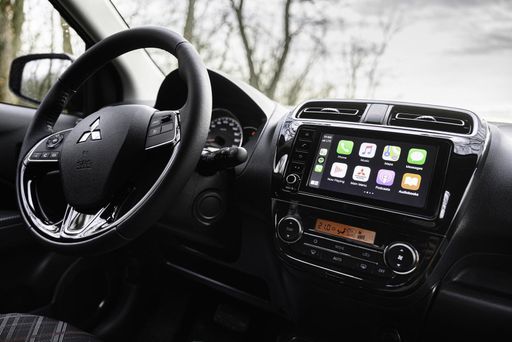 @ presse.mitsubishi-motors.de
@ presse.mitsubishi-motors.de
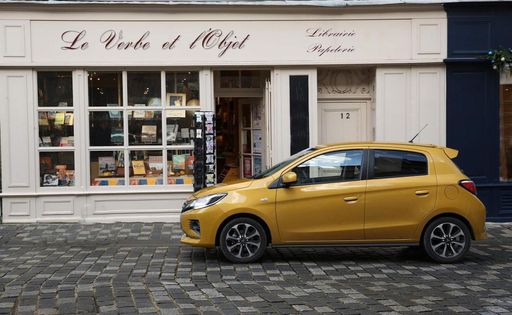 @ presse.mitsubishi-motors.de
@ presse.mitsubishi-motors.de
Volvo EC40
The Volvo EC40 seamlessly combines cutting-edge technology with sleek Scandinavian design, offering a refined driving experience. With its advanced safety features and user-friendly infotainment system, this model caters to both seasoned drivers and modern tech enthusiasts. The vehicle's impressive efficiency and environmentally conscious engineering make it a standout choice for those seeking sustainability without compromising on style.
details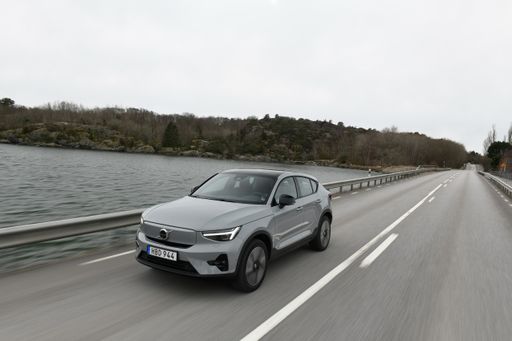 @ media.volvocars.com
@ media.volvocars.com

|

|
|
|
|
Costs and Consumption |
|
|---|---|
|
Price
11600 - 18700 £
|
Price
46600 - 59000 £
|
|
Consumption L/100km
4.9 - 5.5 L
|
Consumption L/100km
-
|
|
Consumption kWh/100km
-
|
Consumption kWh/100km
16.3 - 17.3 kWh
|
|
Electric Range
-
|
Electric Range
487 - 583 km
|
|
Battery Capacity
-
|
Battery Capacity
67 - 79 kWh
|
|
co2
112 - 125 g/km
|
co2
0 g/km
|
|
Fuel tank capacity
35 L
|
Fuel tank capacity
-
|
Dimensions and Body |
|
|---|---|
|
Body Type
Hatchback
|
Body Type
SUV
|
|
Seats
5
|
Seats
5
|
|
Doors
5
|
Doors
5
|
|
Curb weight
940 - 1009 kg
|
Curb weight
2065 - 2185 kg
|
|
Trunk capacity
209 - 235 L
|
Trunk capacity
404 L
|
|
Length
3845 mm
|
Length
4440 mm
|
|
Width
1665 mm
|
Width
1873 mm
|
|
Height
1505 mm
|
Height
1591 mm
|
|
Payload
360 - 400 kg
|
Payload
395 - 435 kg
|
Engine and Performance |
|
|---|---|
|
Engine Type
Petrol
|
Engine Type
Electric
|
|
Transmission
Manuel, Automatic
|
Transmission
Automatic
|
|
Transmission Detail
Manual Gearbox
|
Transmission Detail
Reduction Gearbox
|
|
Drive Type
Front-Wheel Drive
|
Drive Type
Rear-Wheel Drive, All-Wheel Drive
|
|
Power HP
71 HP
|
Power HP
238 - 442 HP
|
|
Acceleration 0-100km/h
14.1 - 15.8 s
|
Acceleration 0-100km/h
4.6 - 7.3 s
|
|
Max Speed
163 - 167 km/h
|
Max Speed
180 km/h
|
|
Torque
102 Nm
|
Torque
420 - 670 Nm
|
|
Number of Cylinders
3
|
Number of Cylinders
-
|
|
Power kW
52 kW
|
Power kW
175 - 325 kW
|
|
Engine capacity
1193 cm3
|
Engine capacity
-
|
General |
|
|---|---|
|
Model Year
2020 - 2022
|
Model Year
2024
|
|
CO2 Efficiency Class
C, D
|
CO2 Efficiency Class
A
|
|
Brand
Mitsubishi
|
Brand
Volvo
|
Mitsubishi Space Star
Introducing the Mitsubishi Space Star: A Perfect Blend of Efficiency and Innovation
The Mitsubishi Space Star continues to impress urban drivers with its compact yet efficient design. Celebrated for its practicality and fuel economy, this hatchback offers a unique blend of new-age technology and reliable performance. Let’s dive into some of the technical details and innovations that make the Space Star a popular choice among compact car enthusiasts.
Engine and Performance
The Space Star is powered by a 1.2-litre, 3-cylinder petrol engine, delivering a respectable 71 PS (52 kW). The engine provides a harmonious balance of power and efficiency, reaching a top speed of up to 167 km/h. With a torque of 102 Nm, drivers can expect smooth city rides and decent highway cruising capabilities. The Space Star's economy ranges from 4.9 to 5.5 litres per 100 kilometres, ensuring that your journeys remain budget-friendly and environmentally considerate.
Transmission and Driving Dynamics
When it comes to the driving experience, buyers have the option of a 5-speed manual transmission or a CVT automatic. This flexibility allows for a more personalised driving experience, whether you prefer the engagement of manual shifting or the convenience of an automatic gearbox. The car's front-wheel-drive setup further enhances its maneuverability, making it an ideal companion for navigating tight city streets.
Design and Dimensions
The Mitsubishi Space Star is designed to turn heads with its sleek, aerodynamic lines while maintaining a practical size. Measuring 3845 mm in length, 1665 mm in width, and 1505 mm in height, it's a perfect fit for urban driving. Despite its compact form, the Space Star offers five seats and five doors, providing ample accessibility and comfort for both the driver and passengers.
Interior Features and Comfort
Inside, the Space Star prioritises comfort and convenience with thoughtfully designed interiors. The luggage space ranges from 209 to 235 litres, ideal for shopping trips or weekend getaways. The vehicle comes in a variety of trim levels, including Basis, Plus, Select, and Top, with each offering distinct features to meet different customer needs. Whether you need basic amenities or more premium touches, the Space Star has a version that will suit your lifestyle.
Safety and Environmental Impact
Safety innovation is a hallmark of the Mitsubishi Space Star, ensuring peace of mind for drivers and passengers alike. Its CO2 efficiency class ranges from C to D, with emissions between 112 to 125 g/km, reflecting its dedication to reducing the environmental footprint. These features contribute to making the Space Star a responsible choice for the eco-conscious driver.
Cost of Ownership
Affordability is another attractive aspect of the Space Star. Prices range from €13,590 to €21,790, making it accessible for a wide array of budgets. Running costs are equally competitive, with monthly expenses estimated between €627 and €767, and cost per kilometre ranging from 25.1 to 30.7 cents, all contributing to a car that is as economical to own as it is to drive.
Conclusion
In summary, the Mitsubishi Space Star offers a compelling package of efficiency, practicality, and modern technology. Its combination of fuel economy, flexible transmission options, and affordability make it a standout choice in the compact car segment. For those looking for a reliable and economical city car, the Space Star remains a strong contender that shouldn't be overlooked.
Volvo EC40
Introduction to the Volvo EC40
The Volvo EC40 has emerged as a standout model in the electric SUV market, embodying a splendid fusion of Scandinavian design and state-of-the-art technology. As part of Volvo’s endeavour towards a sustainable future, the EC40 caters to environmentally conscious drivers who seek a blend of performance, luxury, and innovation.
Powertrain and Performance
The Volvo EC40 is available in both rear-wheel and all-wheel drive configurations, offering a flexible choice for various driving preferences. The model is powered by robust electric motors, with outputs ranging from 238 to 408 PS (175 to 325 kW). This range of power allows for a diverse driving experience, featuring a brisk acceleration from 0 to 100 km/h between 4.6 and 7.3 seconds, appealing to enthusiasts of spirited driving.
Fuel efficiency is a significant advantage of the EC40, boasting a consumption between 16.2 and 17.3 kWh per 100 km. Moreover, the vehicle's electric range impresses with figures stretching from 487 to 584 km, ensuring that long drives are as feasible as they are economical.
Innovative Battery Technology
Equipped with high-capacity batteries ranging from 67 to 79 kWh, the Volvo EC40 leverages advanced battery technology to offer reliability and longevity. This innovation helps in maintaining exceptional energy efficiency while adhering to Volvo’s commitment to reducing environmental impact.
Design and Dimensions
The signature Scandinavian design of the EC40 embodies elegance through its simplistic yet luxurious aesthetics. Its dimensions — 4440 mm in length, 1873 mm in width, and 1591 mm in height — are crafted to provide optimal space and comfort without compromising sleekness. The interior accommodates up to five passengers comfortably, with a boot offering a 404-litre capacity, making it ideal for adventure trips or daily commutes.
Safety and Technology
Volvo has long been synonymous with safety, and the EC40 continues this legacy with an array of advanced safety and driver assistance technologies. The SUV is equipped with cutting-edge features such as automated emergency braking, lane-keeping assistance, and BLIS (Blind Spot Information System), designed to ensure a stress-free and secure driving experience.
Conclusion
The Volvo EC40 stands as a testament to Volvo's dedication to innovation in the automotive industry. With an excellent blend of performance, technology, and efficiency, alongside impressive environmental credentials — including a CO2 efficiency class of A and zero emissions — the EC40 represents a beacon of Volvo’s sustainable future in electric mobility.
Which drive types are available for the Mitsubishi Space Star?
Available as Front-Wheel Drive.
The prices and data displayed are estimates based on German list prices and may vary by country. This information is not legally binding.
